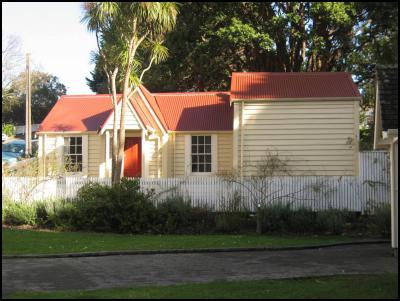Sexton’s Cottage gets top recognition
Sexton’s Cottage gets top
recognition

The Sexton’s Cottage
(Former) in the historic Bolton Street Memorial Park in
Wellington has been registered as a Category 1 historic
place by the New Zealand Historic Places (NZHPT).
Built in 1857 as the residence for the caretaker of the Anglican part of the cemetery, the Cottage survived the construction of the Wellington urban motorway and is one of central Wellington’s earliest intact houses and a rare example of a sexton’s residence. It is directly associated with the colonial settlement of Wellington, being linked to the Bolton Street cemetery included in the original 1840 New Zealand Company survey plan, which now contains the graves of some of the city’s founders, such as the Wakefield family.
NZHPT researcher, Vivienne Morrell says the Sexton’s Cottage is of special significance for its aesthetic, architectural, historical and social value.
“It is a small dwelling built in a style that was popular in the 1850s and 1860s with pit-sawn shiplap weatherboards. There are now only a few examples of property from this period remaining in the Wellington region.”
Various Anglican sextons occupied the cottage for about 30 years until the Wellington City Council took control of the cemetery in 1892. In 1920 the Church of England sold the cottage into private ownership. In 1968, it was included in the land taken for the purposes of constructing the Wellington urban motorway, which cut through the middle of the historic cemetery. Many headstones were removed and 3,700 burials were re-interred in a mass grave near the Sexton’s Cottage.
Ms Morrell says the cottage was spared demolition due to the advocacy of the Friends of the Bolton Street Memorial Park, who recognised its heritage value. The Ministry of Works decided to keep the cottage and restore it, and it was reopened in 1978 and gifted to the Wellington City Council. The cottage was later incorporated into the gazetted Bolton Street Memorial Park reserve.
Today, the cottage is used as a residence for international artists and is a well-loved building near one of the entrances to the memorial park. “It provides a tranquil place and a remnant of colonial history in one of the busiest parts of the capital,” says Ms Morrell.
BACKGROUND
NOTES
Registering
historic places.
Registration is the inclusion on the NZHPT Register of a place or area that is considered part of New Zealand’s historical and cultural heritage. Places may be included on the Register if they possess aesthetic, archaeological, architectural, cultural, historic, scientific, social, spiritual, technological or traditional values. Under the Historic Places Act (1993), places registered may be accorded a ranking of Category 1 or 2 status. The NZHPT also registers wahi tapu and wahi tapu areas.
Registration does not provide any direct protection to historic places or wahi tapu. Protection comes through local authorities protecting their local places by scheduling them in their district plans under the Resource Management Act 1991. In this case resource consent is often required from the Council to modify any scheduled place. About 90 percent of places on the Register are also scheduled in District Plans. More than 5,600 sites are included on the Register, which can be searched online at www.historic.org.nz/TheRegister.aspx
For more information about the NZHPT visit http://www.historic.org.nz


 Gordon Campbell: On The Hikoi Aftermath
Gordon Campbell: On The Hikoi Aftermath Infrastructure New Zealand: Single Agency Needed To Coordinate Climate Adaptation And Recovery
Infrastructure New Zealand: Single Agency Needed To Coordinate Climate Adaptation And Recovery Free Speech Union: Fair Digital News Bargaining Bill Likely To Restrict Access To Information, Polling Shows Most Oppose
Free Speech Union: Fair Digital News Bargaining Bill Likely To Restrict Access To Information, Polling Shows Most Oppose Auckland Transport: Driver Safety Screens Now Rolling Out Across Auckland’s Bus Fleet
Auckland Transport: Driver Safety Screens Now Rolling Out Across Auckland’s Bus Fleet People Against Prisons Aotearoa: 'Expect Resistance' - Community Group Pushes Back Against More Cops With Guns
People Against Prisons Aotearoa: 'Expect Resistance' - Community Group Pushes Back Against More Cops With Guns Greenpeace: New Zealand Drops In Global Ranking On Climate Action
Greenpeace: New Zealand Drops In Global Ranking On Climate Action PSA: Spending Cuts Need To Stop - PSA Urges Govt To Listen To Economists
PSA: Spending Cuts Need To Stop - PSA Urges Govt To Listen To Economists


